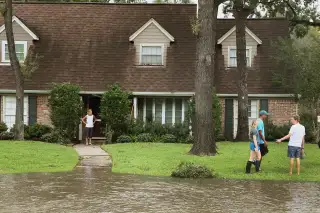After Disaster Strikes, Should You Tap Your 401(k)?

The Internal Revenue Service yesterday made it easier for victims of Hurricane Harvey and their family members to tap their retirement savings for flood-related expenses. But is it a good idea to raid funds you've saved for the future?
Most 401(k) plans already allow participants to take loans and hardship distributions. The IRS yesterday relaxed the requirements for these for both 401(k) and 403(b) plans, allowing those affected by the storm to access their money more quickly and easily than under standard procedures. The agency expanded the definition of hardship to include such needs as food and shelter and allowed employers to release funds before receiving documentation from employees. Yesterday's action also allows certain plans that currently don't permit hardship distributions to do so for Hurricane Harvey relief.
Loans from 401(k) plans aren't taxed but must be repaid. Hardship distributions, on the other hand, are included in participants' gross income for the year and subject to ordinary income tax rates (unless the account is a Roth 401(k), whose funds are taxed on the way in and not the way out). What's more, money withdrawn as part of a hardship distribution is generally subject to an additional 10% penalty. Those provisions remain in place for now -- it would take an act of Congress to waive them, says Nevin Adams, chief content officer of the American Retirement Association. Congress passed a law in 2005 allowing Hurricane Katrina victims to take qualified distributions from their retirement plans of up to $100,000 without penalty, and it's possible that lawmakers will take similar action to help those affected by Harvey.
Yesterday's announcement both applies to Harvey survivors living in designated areas and also to certain relatives who want to help them. Account owners living anywhere can tap their retirement accounts to help a grandparent, parent, son or daughter who lived or worked in the disaster area.
Financial planners generally agree that taking loans or hardship distributions from your 401(k) should be a last resort. Ideally, you'll have outside savings and insurance to help defray emergency expenses, including money in a taxable brokerage account that you can tap easily without penalty. Taking a hardship distribution means losing the money you already contributed, plus any market appreciation that would come on top of it. Money in 401(k) accounts is generally shielded in bankruptcy proceedings, so even those in dire financial straights can keep it for the future.
But practically speaking, most Americans don't have substantial savings outside their retirement accounts. And many affected by Harvey don't have flood insurance. Byron Ellis, managing director of United Capital in The Woodlands, Texas, a suburb of Houston, has heard of a retired couple without flood insurance whose home took in six feet of water during Harvey. "Mostly likely they'll have to reduce their lifestyle from now on," Ellis says.
Homeowners generally still owe mortgage payments on homes that have been destroyed, although lenders may offer relief for a period of time. The Mortgage Bankers Association has a web site for those affected by Harvey.
The bottom line? Many of those facing serious damage to their homes will have little choice but to tap their retirement savings, and the IRS has made it easier to do that. "All the usual cautions apply," Adams says, "But these are extraordinary times."
Check out Money's list of organizations accepting donations of behalf of Harvey victims.